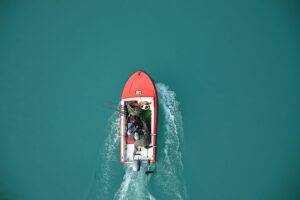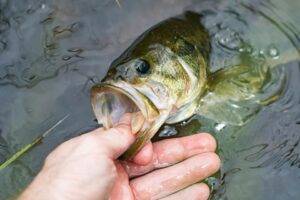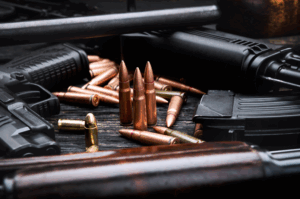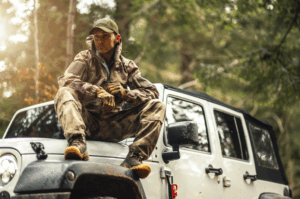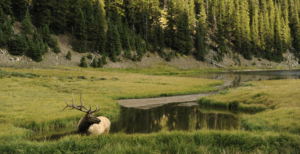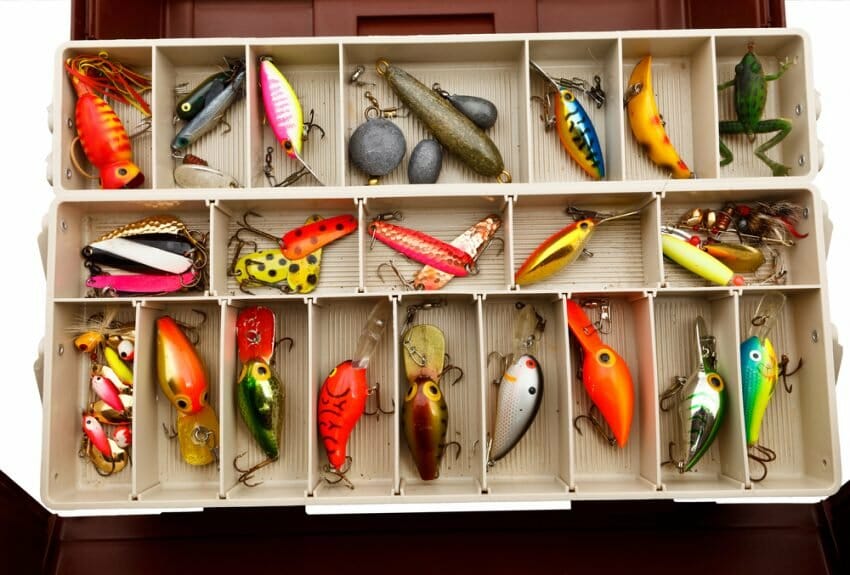
Nothing is worse than getting out on the water only to realize that you’ve forgotten something essential. It’s happened to me a thousand times. I’m excited, grateful for the chance to fish, eager to land a personal record.
Visions of 10-pound bass or massive tarpon dance in my head. I get butterflies in my stomach when I think about a huge fish breaking the surface, thrashing furiously in an attempt to throw the hook. A shiver of excitement goes through me when I think about the buzzing sound a reel makes when a fish starts ripping off line.
Then, right as I’m settling down to fish, I notice that I forgot something really important. A particular set of lures. A tool I absolutely needed. My fishing rod (just kidding, that hasn’t happened…yet).
When that happens, I want to scream. I don’t because I don’t want to scare away the fish, but you get the point. And this becomes even more of a problem if I don’t discover my mistake until I’m well out on the water, far away from my vehicle.
But what’s the solution? How can I avoid making these critical omissions?
It’s all about the Santa Claus technique: making a list, checking it twice.
In this post, I’m going to give you a list of the essential items you need to carry in your tackle box. While this list isn’t exhaustive, it will give you a solid foundation and should keep you from totally screwing up your fishing trips.
So without further ado, here are the 13 essential things you MUST have in your tackle box.
#1 – The Proper Lures and Bait
First things first. Before every fishing trip you need to ensure that you have the proper lures and bait for that trip. This is key. I can’t tell you how many times I’ve gotten out on the water only to realize that I had the wrong lures. When this happens, I’m forced to try to catch fish on lures not designed for those fish. Which, as you can imagine, doesn’t work so well.
As you pack your tackle box, ask yourself these questions:
– What species am I fishing for?
– What lures and bait do these fish bite?
– What are the water conditions and do I have the right lures for those conditions?
– Do I have the proper rigs if I’m using live bait?
– Do I have enough variety of lures to be able to switch if they aren’t biting on one lure?
– Do I have an extra of my best lure in case I lose it?
Being unprepared is about the worst thing you can do before venturing out onto the water. Take the time to walk through the questions above to make sure you have all the proper lures and baits for the given conditions.
#2 – Extra Line
There are many different occasions when you may need extra fishing line. You get a nasty tangle in your reel and have to strip all your line. You hook into a huge fish and it completely runs you dry. Or maybe you just discover that the line on your telescopic fishing rod is old and cracked and isn’t casting well.
In any of those cases, you need to have backup line in your tacklebox.
You may be tempted to think that any old backup line will be fine, but you couldn’t be more wrong. There are a number of different things you need to consider.
– What type of fishing are hoping to catch? Bigger fish obviously require much heavier line. Fish with teeth may require steel liters.
– Will you be fishing in heavy vegetation? If that’s the case, you may wanted braided line rather than standard monofilament.
If you don’t know the answer to these questions, you may want to purchase several small spools of line to have on hand.
#3 – A Knife
A knife is indispensable on a fishing trip. You will use it for cutting line, helping to get snarled hooks out of a fish’s mouth, and dozens of other situations. Without a knife you’re going to have a really difficult time cutting line after tying on a new lure.
It’s crucial that your knife be razor sharp. If it’s not, you risk the possibility of slicing yourself. Take the time to sharpen your knife thoroughly before your trip.
If you plan on keeping the fish you catch, you’ll also probably want to have a filet knife for cleaning the fish. Trying to use a regular knife to cut precise filets doesn’t work well and just mangles the meat.
#4 – Needle Nose Pliers
If a fish has sharp teeth or completely swallows a lure, you’re going to need a set of needle nose pliers. These allow you to get far down into the fish’s mouth without sticking your actual hand in.
You’ll also need these pliers if you catch a fish that has a particularly tough lip, such as catfish. Sticking your hand down the gullet of a catfish is a baaaad idea. Their mouths are like sandpaper and can rip your hand to pieces.
#5 – Polarized Sunglasses
When you’re fishing in the glaring sun, it can be really hard on your eyes and also make it very difficult to see in the water. If you’re trying to pick out underwater cover to cast into, you’ll find it almost impossible.
Polarized and some of the Best Fishing Sunglasses spare you the piercing brightness and significantly cut down on the glare from the water. They allow you to look into the water and see beneath the surface, which in turn allows you to fish more effectively.
#6 – Extra Sinkers
Depending on your setup, you may want to bring extra sinkers. Typically, sinkers are used with live bait and plastic baits. The type of sinker differs depending on what you’re using, some rigs calling for split shot, others calling for slip sinkers, and still others calling for pyramid sinkers.
Choose extra sinkers that will match both how you’ll be fishing (the bait) and where you’ll be fishing (the underwater terrain). So, for example, if you’re going to be fishing in a location with lots of underwater logs and vegetation, the last thing you want is heavy sinkers that can get snagged. In fact, you may not want to use any sinkers.
The point is that the extra sinkers you bring should reflect what the day’s fishing will look like.
#7 – A Stringer
Assuming you have a great day on the water and that you’re keeping your fish, you’re going to need a stringer. A stringer allows you to keep fish in the water so that they stay fresh and don’t begin to decompose in the sun.
Generally speaking, there are two types of stringers. A single line stringer is simply a piece of nylon rope with a piece of metal on one end and a metal ring on the other. You run the metal piece through the gill of the fish then connect it to the metal ring. The other type is made of chain and has individuals clasps for each fish.
For a tackle box, the simple line stringer may work more effectively due to it’s slimmer profile.
#8 – A First Aid Kit
Have you ever gotten a hook through the ear or through a finger? It’s an incredibly painful sensation and will usually create a lot of blood. In that case, you’re going to want to have a first aid kit, complete with antibiotic ointment, bandages, and perhaps some sanitizer.
#9 – A Poncho
If you get caught in the rain, you’re day can be absolutely ruined, especially if you’re miles from shore. Keep a small, plastic poncho in your tackle box to keep you from getting soaked when the elements conspire against you.
#10 – Your Fishing License
If you get caught fishing without a license, you could be in serious trouble. You’ll have to pay a fine and could face further legal action depending on how many fish you caught. Always keep your license handy, whether in your tackle box or present on your body.
Let’s just say that park rangers don’t take kindly to people stealing fish from their lakes.
#11 – Bug Repellent
Have you ever gotten slammed by a swarm of mosquitos on a warm summer’s evening? It can quickly turn a pleasant outing into a jungle nightmare. I was recently fishing and had my night cut short when I was being constantly dive bombed by a horde of mosquitoes.
Keep a small bottle of repellent in your tackle box for just such an occasion.
#12 – Bobbers
Bobbers are really only necessary if you’re using live bait, and even then they tend to be favored only by amateurs. However, there are some experts who know how to use a bobber with deadly effectiveness.
If you fall into either camp, consider throwing in an extra bobber or two. Who knows – if the fish are refusing to bite on anything else, maybe they’ll go for bait suspended from a bobber.
#13 – A Tape Measure
If you plan on keeping fish or bragging about them, you need to know exactly how long they are. Keeping fish that are below the legal limit can get you into serious trouble and result in you paying hefty fines. And if you don’t know how long a fish was, you certainly can’t brag about it to your buddies.
The tape measure should be able to accommodate the biggest fish you might catch. If you only anticipate catching bass, a three foot tape should be fine. If you think you might land a musky on the other hand, you’ll need something quite a bit longer.
#14 – A Few Munchies
If you have any remaining space, it can’t hurt to include a few munchies. I always enjoy sunflower seeds and beef jerky when I’m out on the water. Just enough food to take the edge off of hunger but not a full meal.
Conclusion
With just a little bit of foresight, you can ensure that you never forget another important item when you go fishing. Use this post as a list of sorts. Go through it prior to each trip, checking off items as you go. Yes, it may take a bit of extra time, but it will be worth it in the end.
Article Written By; John Hawthorne
About the Author: John Hawthorne is a health nut from Canada with a passion for travel and taking part in humanitarian efforts. His writing not only solves a creative need it has also lead to many new opportunities when traveling abroad.

